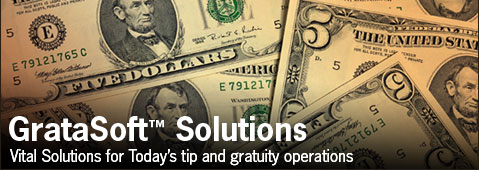| Home | Products | Learning Center | Contact |
 |
John Marshall Patent Pending tools and processes, which increase value through enhanced operational compliance and material reductions in administrative burden. |
Articles Tip-Out tracking: wage & hour class action repellent? ATIP: How IRS immunity can save you money Why Enter an IRS Tip Agreement? An Insider's View of Tip Accounting Is your Gratuity policy costing you money? Planning your transition into Tip Compliance Getting on TRAC for tip compliance |
Getting on TRAC for tip complianceBy John MarshallIf you are a newcomer to tip compliance, are interested in participating in a tip program but are hesitating, and want to start slowly, the IRS TRAC program may be your best option. TRAC could be the least costly program, allowing each operator to embark on this program just where they are today in terms of tip rates and declarations. There are two basic requirements of TRAC that are relatively easy, but can amount to a mountain of administration if not supported with automation. The first requirement is that all new employees are trained on the virtues and benefits of declaring 100% of their tips received. Existing employees must be included in such refresher meetings at least 4 times per year. The second, more demanding requirement is to present each employee with a “TRAC Summary” meeting IRS requirements. This must happen at least monthly, but preferably with each paycheck. Such summaries present all transactions for that period distilled into two groups – those representing charged receipts and those paid with cash. This report is intended to clearly point out differences between declared charged tip rate and cash tip rates. All gratuity sales must be removed – (SEE 8027 demystified) Most POS systems provide much of the needed data organized by server to simplify this task, however most often do not calculate or present the legitimate exceptions, and regulatory nuances, which can make your establishment and staff virtually audit free. These details are spelled out throughout TipCompliance.com pages and include the separation and payment of gratuities, non-tippable sales, and initiating a system for capturing and reporting all tip-outs. What many operators find out is that once these changes and procedures are in place and operating, other tip programs such as ATIP begin to look significantly more appealing, inexpensive, with lower administration and more protections. Some credit heavy operators have even found that switching to ATIP can reduce their tip declarations. Finally, the IRS can revoke a TRAC for several reasons, including the following:
TRAC is a superb initial program for operators to initiate tip procedures and enter a tip program, which can later be leveraged, into greater value at reduced cost. Mr. Marshall is the owner of Main Street Gourmet Eatery and Bakery, Main Street Fine Catering, and Main Street Euro-American Bistro and Bar. He is president of GrataSoft Solutions, developer and publisher of Grata Restrateur and Grata Persona; patent pending solutions for implementing, tracking and managing tip policy, including IRS TRAC, TRDA and EmTRAC Tip Program compliance automation for businesses and individuals. For more information, please visit GrataSoft.com. |
Presently interfaces with Aloha™ POS and Datamatics TC-1™ inquire for additional system interfaces. © EAT, INC. Patent Pending. All rights reserved. |
Hosted and designed by Princeton Online |